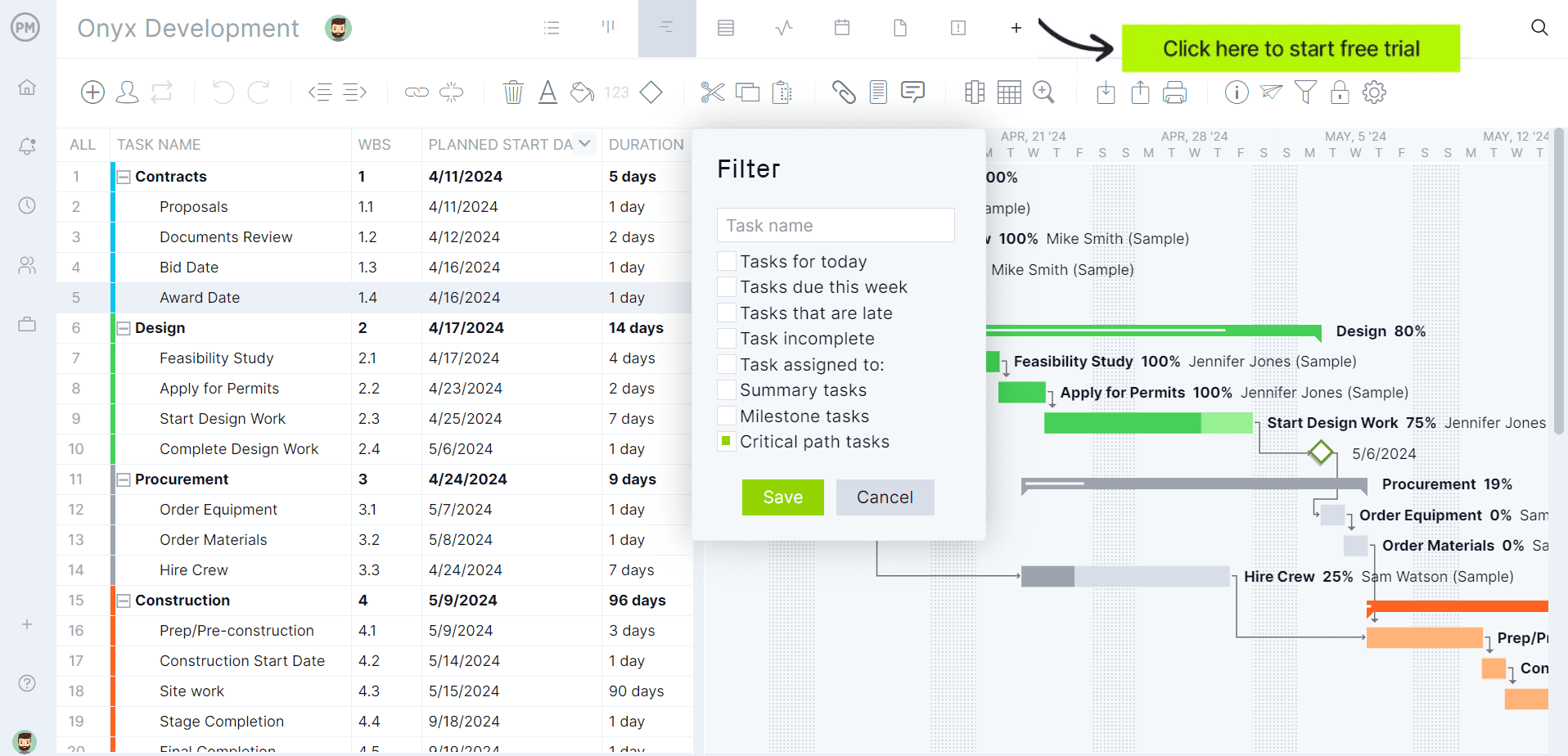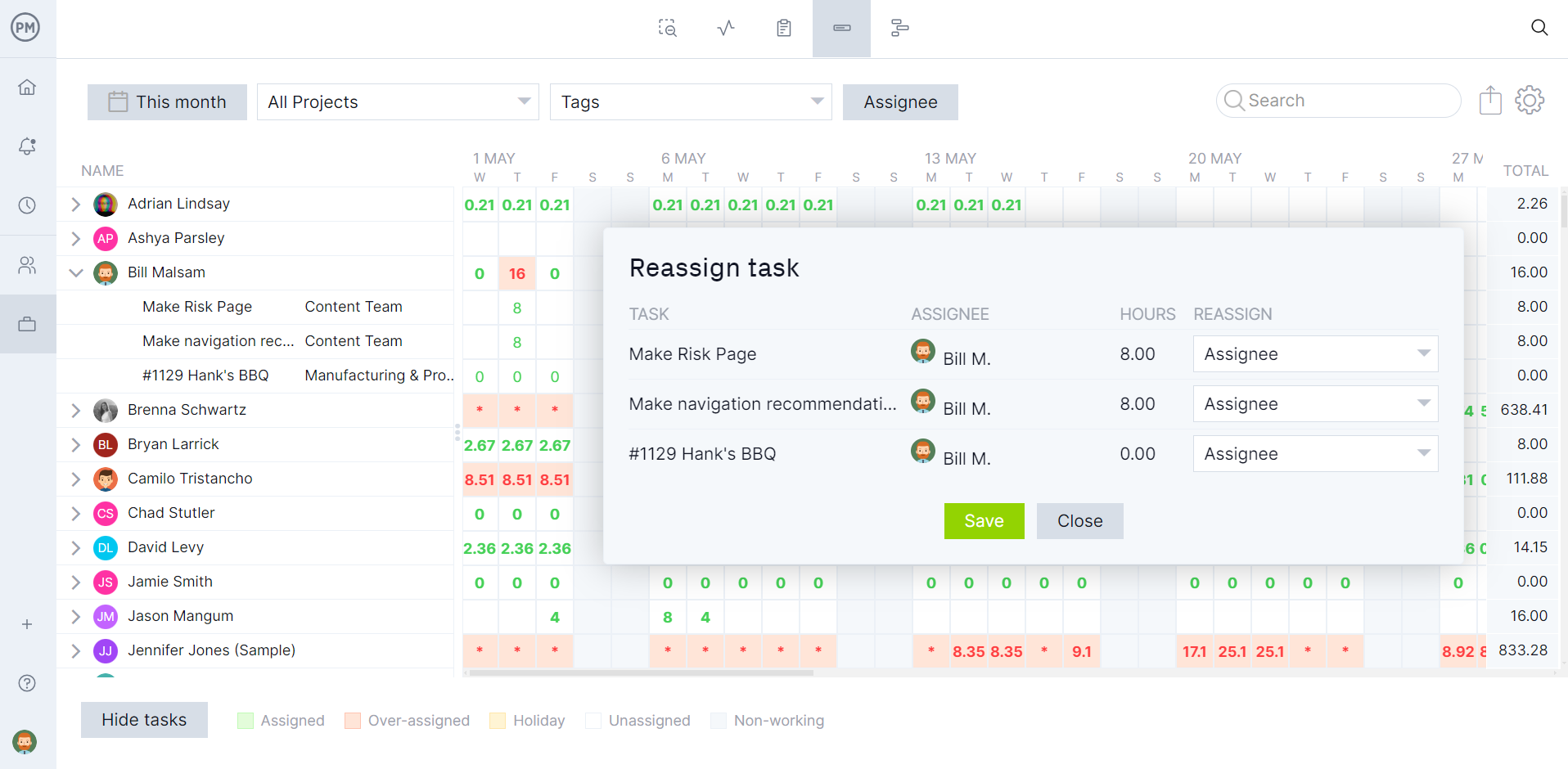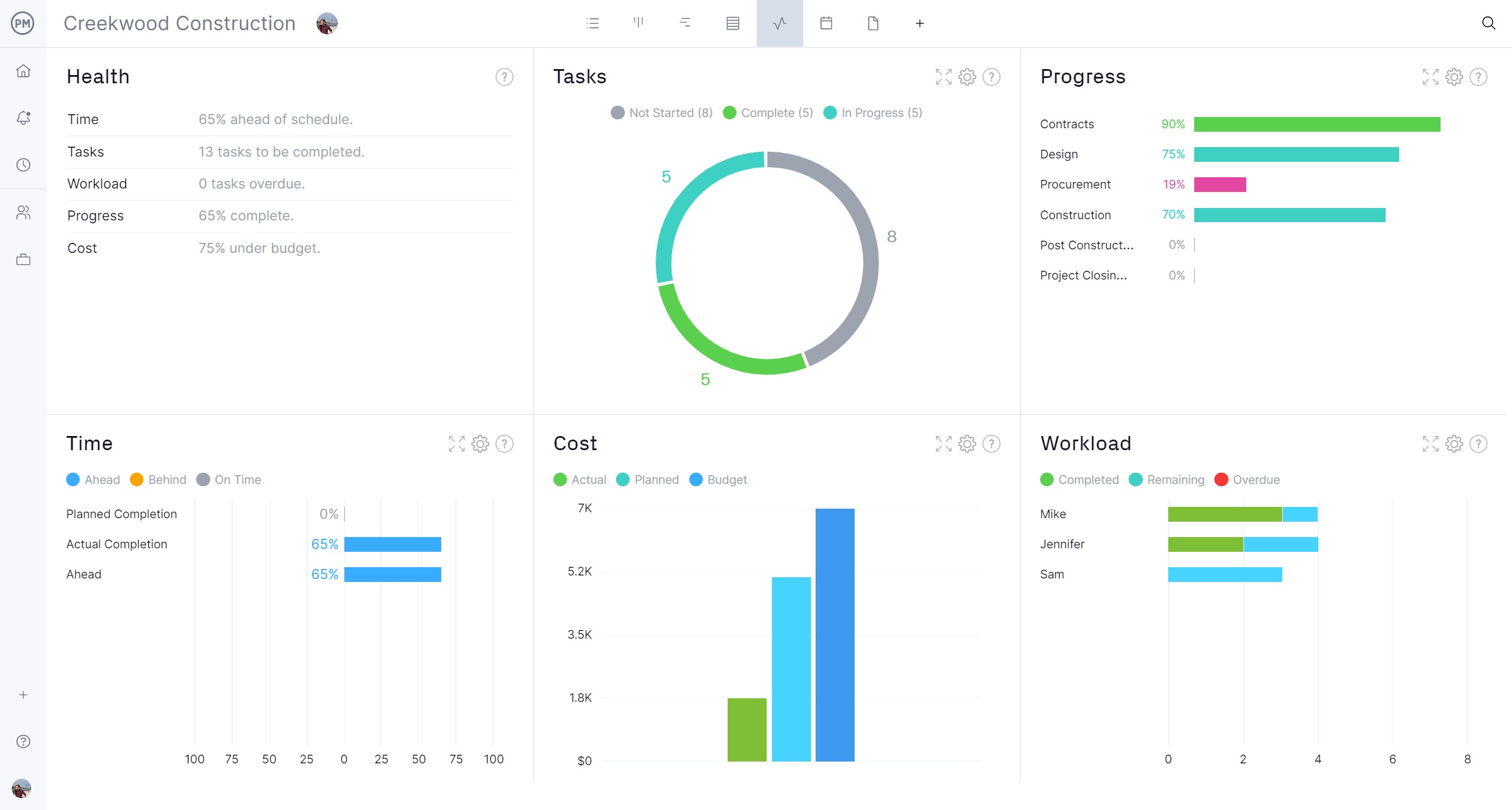Professional services apply to a wide range of industries. The professional services industry is large and to better understand it, we define the term and provide examples of professional services firms.
Along the way, we explore the key challenges to the professional services industry and even link to a few free templates for professional services firms to help those in those industries. Finally, we demonstrate how upgrading to project management software adds efficiency to the process.
What Are Professional Services?
Professional services refer to specialized services provided by individuals or firms that need specific expertise skills and qualifications. These services are typically knowledge-based and delivered to businesses, organizations or individuals to help them achieve specific objectives or solve particular problems.
The characteristics of professional services, as noted, include expertise. They have specialized knowledge and skills that clients hire them for. Professional services firms also customize or tailor their services to meet the specific needs of their clients. These are intangible, not physical products and, therefore, are often difficult to measure or evaluate before purchase. If hired, they involve collaboration as the service providers and clients will interact significantly.
While professional services encompass a variety of specialized fields and rely heavily on expertise and knowledge to deliver value to their clients, effective project management is crucial to ensure that projects are completed on time, within budget and meeting client expectations. That’s why professional services firms use project management software.
ProjectManager is award-winning project and portfolio management software with multiple project planning and scheduling tools. Projects can be planned on Gantt charts, which organize tasks, resources and costs. Users can also link all four types of dependencies to avoid costly delays, filter for the critical path to identify essential tasks and set a baseline to track progress and cost in real time. Teams can execute work on kanban boards or task lists, while clients can stay informed on progress with the calendar view. Get started with ProjectManager today for free.

Types of Professional Services
Professional services can be categorized into two main types: independent and embedded. Let’s take a look at these two different types of professional services and see how they differ, but are both essential for organizations to leverage specialized skills and knowledge, depending on their specific requirements and contexts.
Independent Professional Services
These are services provided by external consultants or firms that operate independently of the client organization. Common independent professional services include consulting, legal, accounting, engineering, marketing, training and development services.
Embedded Professional Services
Embedded professional services are those that are integrated within a client organizational structure. They often work as part of the client’s team and provide ongoing expertise and support. Common embedded services are similar to those of the independent variety, only in-house, but they can also include IT support, human resources and project managers.
6 Examples of Professional Services Firms
To better understand what a professional services firm is, let’s look at some examples that we’ve namechecked but haven’t defined. There are more than these six, but they provide a bit more insight into the professional services industry.
- PMO Professional Services: A project management office (PMO) can be embedded or independent, such as a PMO as a service (PMOaaS). Either way, they establish consistent project management methodologies, tools and templates to ensure uniformity across projects. They also provide project governance for project approval, monitoring and reporting. PMOs assist in resource management across multiple projects to optimize efficiency and utilization.
- Construction Professional Services: Specialized services that are provided throughout the lifecycle of a project, encompassing various disciplines aimed to ensure successful project planning, execution and completion. Some key types of construction professional services include architectural, engineering, construction project management, quantity and land surveying, environment consulting and more.
- Marketing Professional Services: This encompasses a range of specialized offerings designed to help businesses develop, implement and optimize their marketing strategies. The aim is to enhance visibility, engage target audiences and drive sales. This is done through marketing strategy development, branding services, digital, content and email marketing. Public relations, market research and analytics, web development and graphic design also play a role.
- Human Resources & Professional Staffing Services: These services are aimed at managing an organization’s workforce and supporting its staffing needs. It does this through recruitment and talent acquisition, employee onboarding, training and development, performance management, compensation and benefits administration, employee relations, policy, compliance and risk management.
- Business & Management Professional Services: Works to improve operations, strategy and overall performance. These are professional services with deep industry knowledge and experience. They offer management consulting, strategic planning, change management, operations management, human resources consulting, financial advisory services, marketing and IT consulting, project management, sustainability consulting, accounting and bookkeeping
- IT Professional Services: Experts in information technology help organizations effectively implement, manage and optimize their technology infrastructure and solutions. This is done through IT consulting, systems integration, network, cybersecurity and cloud services, software development, data and management analytics, IT support and helpdesk services, infrastructure management, disaster recovery and business continuity.

Key Challenges of the Professional Services Industry
As with any discipline, there are challenges for those working in the professional services sector. There are those that are commonly found throughout different industries, such as talent acquisition and retention, market competition and adoption of new technologies. The following challenges, which aren’t exactly unique to professional services, are more likely to impact this field than other industries.
1. Managing Client and Stakeholder Expectations
There are many fronts in managing client and stakeholder expectations. For one, different clients and stakeholders have varying needs, priorities and visions of success. Misunderstandings can arise from inadequate or unclear communication. Then there’s the risk that clients and stakeholders will alter their expectations mid-project due to new information, market changes or internal dynamics. To avoid these challenges, establish open lines of communication, set realistic goals and document everything to manage their expectations.
2. Budgeting and Cost Tracking
Professional services projects often involve a variety of costs, including labor, materials and overhead. Accurately forecasting these costs can be difficult. Then there are changes in scope, which can lead to unplanned expenses. Another issue is allocating resources while trying to keep costs in check. Misallocation can lead to budget overruns and resource shortages. Using different billing methods, such as hourly, fixed fee, value-based, etc., can make tracking costs confusing and inconsistent. These challenges can be overcome by creating comprehensive budgets, investing in project management software and monitoring and reporting on costs regularly.
3. Managing Multiple Projects Simultaneously
Professional services teams often run several projects at once, which leads to resource strain, scheduling conflicts and diminished quality. For example, sharing resources across projects can lead to conflicts and inefficiencies. Diluted focus risks reducing the quality of work and increasing errors. To avoid this, practice project prioritization by using a prioritization matrix and establishing clear criteria. Use resource management software to allocate and track resources across projects.
4. Meeting Project Timelines
Not being able to meet deadlines where timely delivery is often linked to client satisfaction and business success is a major challenge for professional services firms. It can lead to scope creep and resource constraints, resulting from poor planning and unrealistic timelines. Having to depend on client input, approvals or deliverables can also slow down project progress. Setting clear objectives and creating a detailed timeline can help to avoid these issues as well as effective resource management and risk management to identify risks and have mitigation plans in place.
Free Templates for Professional Services Firms
Avoiding challenges in the professional services industry requires investing in project management software. Those who aren’t ready to upgrade, though, can find benefits in downloading these free templates for professional services.
Service Report Template
A service report is a document that collects the work done during a service appointment. This free service report template for Word can apply to any industry that provides a service for the public, especially professional services firms. It summarizes the work done for the customer and helps the professional services company track changes, which shows where there can be improvements in performance and cost reductions.
Service Blueprint Template
Download this service blueprint template for Excel to use as a visual tool to help service providers better understand the process related to the service they’re delivering. This free template shows the dependencies in the service while emphasizing customer expectations. This leads to greater customer satisfaction and improves the quality of the service as well as the communication between the service provider and the customer.
Service Proposal Template
Use this free service proposal template to capture information that both the service provider and client will need to agree on before signing a contract. This allows them to hash out the details until each party is satisfied with the conditions of the service. Professional services firms use this to impress potential clients, while clients use this to ensure that the company they hire understands the scope of the project and can meet their requirements.
Service Level Agreement Template
This free service level agreement template allows service providers to establish a legal agreement with their customers, specifying the terms, conditions and standards of service that will need to be met. It helps both parties understand their roles and responsibilities to ensure customer satisfaction.
How ProjectManager Helps Professional Services Firms
Templates are no way to run a business. Try keeping clients happy, deadlines met and resources allocated on a spreadsheet. They can do a lot, but they’re unable to capture the real-time data needed to manage multiple projects at the same time, track costs and collaborate. Templates are static documents that require manual updates. Who has time for that? Upgrade to project management software and take business to another level. ProjectManager is award-winning project and portfolio management software with multiple project views to plan, manage and track projects in real time.
Robust Resource Planning and Cost Tracking Features
Professional service firms use resource planning to ensure the right people with the right skills are assigned to tasks, which maximizes productivity. When onboarding teams, managers can set their availability, including PTO, vacation and global holidays, as well as list their skill sets, which makes it easier to assign them tasks. Then go to the team page or color-coded workload chart to view their allocation and balance the workload across teams to keep them working at capacity without threat of burnout. To track labor costs, use our secure timesheets, which streamline payroll and provide a window into expenditures while showing the progress of each team member.

Real-Time Data Dashboards and Reports
There’s more than one way to track costs. For a high-level overview of the project’s key performance indicators (KPIs), toggle to the real-time project and portfolio dashboard. Once a baseline is set on the Gantt chart, the dashboard automatically collects live data and displays it on easy-to-read graphs and charts that show metrics such as time, cost, workload and more. It’s like an instant status report. For more information, use our customizable reports on project and portfolio status, workload, variance, timesheets and more. They can be filtered to get deep into the weeds for managers and their teams or provide a general overview to keep stakeholders informed on progress.

Professional Services Industry FAQs
There might be a few more questions about professional services. Before we end, let’s post a couple of frequently asked questions with short answers.
What Is a Professional Services Consultant?
A professional services consultant is an expert who provides specialized knowledge and skills to help organizations improve their performance, solve specific problems or achieve strategic objectives.
What Is a Professional Services Agreement?
A professional services agreement is a formal contract between a service provider, such as a consultant, contractor or agency, and a client. It outlines the terms and conditions under which professional services will be rendered, defining the scope of work, expectations and responsibilities for both parties.
Related Professional Services Content
Of course professional services is a large field and we’ve only scratched the surface. For those who are still hungry for content on the subject, the following are several recent posts we’ve made that cover such things as field service management, service blueprints and service-level agreements.
- Project Management for Professional Services Providers
- Field Service Management: Key Areas, Challenges & Tools
- Service Proposal Template
- Professional services project management software
- What Is a Service-Level Agreement?
- PMO as a Service (PMaaS): Benefits & Disadvantages
ProjectManager is award-winning project and portfolio management software that connects teams whether they’re in the office or out in the field. They can share files, comment at the task level and stay updated with email and in-app notifications. Join teams at Avis, Nestle and Siemens who use our software to deliver successful projects. Get started with ProjectManager today for free.



